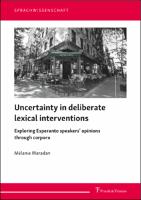Uncertainty in deliberate lexical interventions
Exploring Esperanto speakers’ opinions through corpora
Author(s)
Maradan, Mélanie
Collection
Swiss National Science Foundation (SNF)Language
EnglishAbstract
Language managers in their different forms (language planners, terminologists, professional neologists …) have long tried to intervene in the lexical usage of speakers, with various degrees of success: Some of their lexical items (partly) penetrate language use, others do not. Based on electronic networks of practice of the Esperanto speech community, Mélanie Maradan establishes the foundation for a new method to extract speakers’ opinions on lexical items from text corpora. The method is intended as a tool for language managers to detect and explore in context the reasons why speakers might accept or reject lexical items. Mélanie Maradan holds a master’s degree in translation and terminology from the University of Geneva/Switzerland as well as a joint doctoral degree in multilingual information processing and philosophy (Dr. phil.) from the universities of Geneva and Hildesheim/Germany. Her research interests include planned languages (Esperanto studies) as well as neology and corpus linguistics. She works as a professional translator and terminologist in Switzerland.
Keywords
deliberate lexical interventions; DLI; Esperanto; planned language; extralinguistic nature; linguistic nature; neologism; NLP; language management; language changeDOI
10.26530/20.500.12657/43200ISBN
9783732906901, 9783732993000, 9783732992379Publisher
Frank & TimmePublisher website
https://www.frank-timme.de/Publication date and place
Berlin, 2020Series
Sprachwissenschaft, 48Classification
Sociolinguistics
Semantics, discourse analysis, stylistics
Psycholinguistics and cognitive linguistics
Computational and corpus linguistics
Esperanto


 Download
Download Web Shop
Web Shop